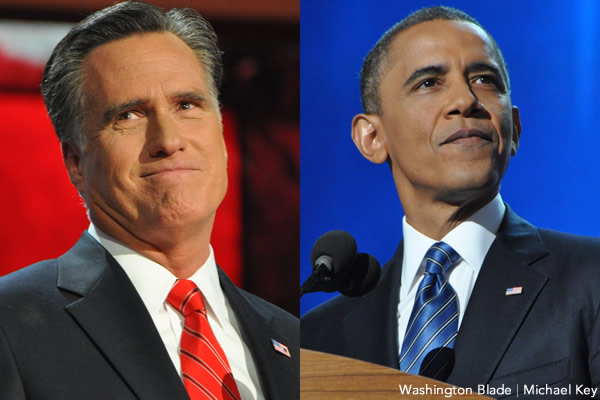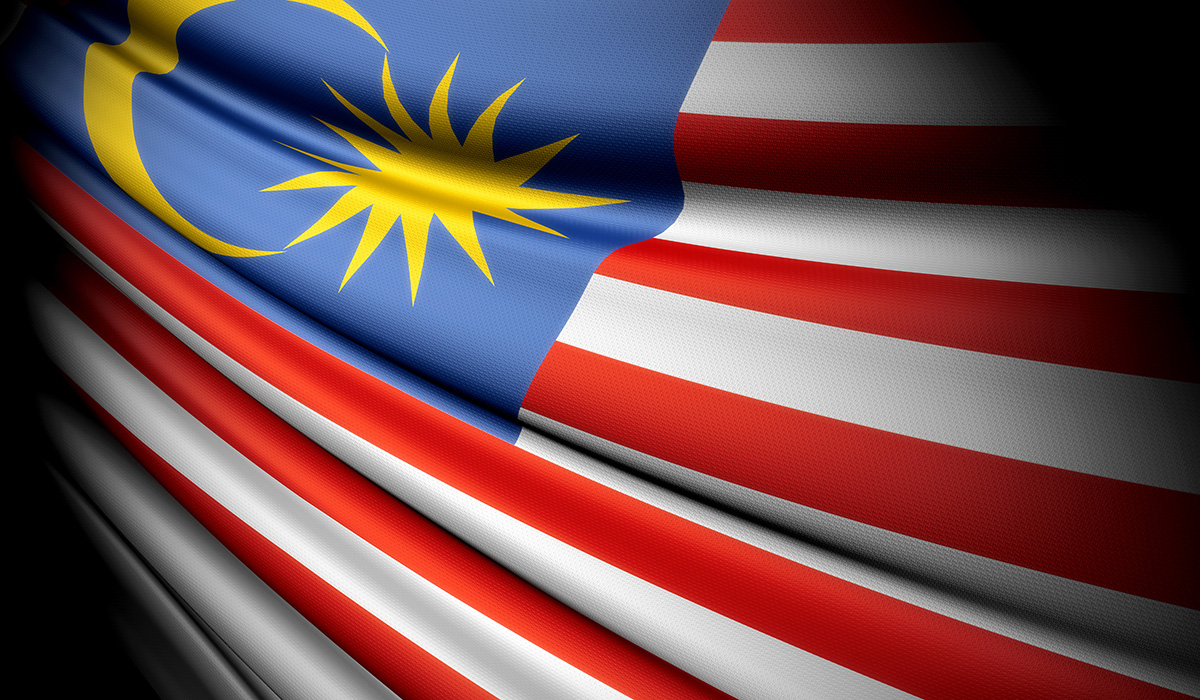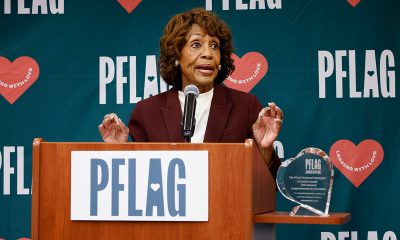News
Obama vs. Romney on LGBT issues
Candidate stances on same-sex family rights, military equality, employment and more


Republican presidential nominee Mitt Romney and President Obama are making their final push in the days before Election Day (Blade file photo by Michael Key)
The Washington Blade breaks down some of the most frequently cited LGBT issues and where each Presidential candidate stands.
MARRIAGE EQUALITY
OBAMA: SUPPORTS
In May, President Obama ended his 19-month “evolution” and expressed his support for marriage rights for gay couples.
ROMNEY: OPPOSES
Mitt Romney has said he opposes same-sex marriage as well as civil unions that offer the same legal benefits of marriage. He’s campaigned on support for a Federal Marriage Amendment, saying states shouldn’t have different rules with respect to marriage.
9 RACES TO WATCH: LGBT CONGRESSIONAL CANDIDATES
DOMA REPEAL
OBAMA: SUPPORTS
Obama endorsed legislation that would repeal the Defense of Marriage Act known as the Respect for Marriage Act. The Obama administration also no longer defends the Defense of Marriage Act in court and has said laws related to sexual orientation should be subjected to heightened scrutiny.
ROMNEY: OPPOSES
Romney supports DOMA and has pledged to resume defending the law in court should he win the White House.
MARRIAGE EQUALITY AT STAKE IN N.H. GUBERNATORIAL RACE
“DON’T ASK, DON’T TELL”
OBAMA: OPPOSES
In 2010, Obama signed legislation to repeal “Don’t Ask, Don’t Tell,” which was lifted from the books nearly a year later following certification. Still, openly transgender service is prohibited and the Pentagon has yet to make administrative changes to afford certain benefits to gay service members with same-sex partners.
ROMNEY: SUPPORTS
Romney once expressed support for “Don’t Ask, Don’t Tell,” but his most recent statement on the issue, made December 2011, is that he doesn’t plan to return to that policy now that the law has been repealed.
UNITING AMERICAN FAMILIES ACT
OBAMA: MOSTLY SUPPORTS
The Obama administration has taken steps to ensure bi-national same-sex couples can stay together in the United States — most recently issuing a memorandum saying foreign nationals without legal status in same-sex relationships should be low priority for deportation cases. The White House has suggested Obama wants to include language for bi-national couples in comprehensive immigration reform. Obama has yet to endorse the Uniting American Families Act, but has expressed support for its general principles.
ROMNEY: UNKNOWN
Romney hasn’t publicly addressed the issue of bi-national same-sex couples, but has said he supports no amnesty for undocumented immigrants and wants to impose a policy where immigrants without legal status will want to self-deport.
HOW ARE LGBT POLITICOS SPENDING ELECTION NIGHT?
EMPLOYMENT NON-DISCRIMINATION ACT
OBAMA: SUPPORTS
Obama is a long-time supporter of ENDA, but the White House said he won’t issue at this time an executive order barring federal contractors from discriminating on the basis of sexual orientation and gender identity.
ROMNEY: UNKNOWN
Romney’s last stated position on ENDA was in 2007 when he said states could implement workplace non-discrimination policies related to sexual orientation, but he doesn’t support federal legislation. He hasn’t addressed the legislation over the course of the 2012 campaign.
The White House
Empty seats, canceled shows plague Kennedy Center ahead of Trump renaming
It would take an act of Congress to officially rename the historic music venue, despite the Trump-appointed board’s decision.

The board of the Kennedy Center in Washington, D.C., voted to rename it the Trump-Kennedy Center, according to the White House Press Office.
White House Press Secretary Karoline Leavitt announced the decision in a post on X Thursday, thanking the president for his work on the cultural center “not only from the standpoint of its reconstruction, but also financially, and its reputation.”
Speaking to reporters later that day at the White House, Trump said he was “surprised” and “honored” by the board’s vote.
“This was brought up by one of the very distinguished board members, and they voted on it, and there’s a lot of board members, and they voted unanimously. So I was very honored,” he said.
Earlier this year, GOP Rep. Mike Simpson of Idaho introduced an amendment that would have renamed the building after first lady Melania Trump, later saying she had not been aware of his efforts prior to the amendment’s public introduction.
Despite the board’s vote (made up of Trump-appointed loyalists), the original laws guiding the creation of the Kennedy Center during the Eisenhower, Kennedy, and Johnson administrations explicitly prohibit renaming the building. Any change to its name would require an act of Congress.
Trump has exerted increasing control over the center in recent months. In February, he abruptly fired members of the Kennedy Center’s board and installed himself as chair, writing in a Truth Social post at the time, “At my direction, we are going to make the Kennedy Center in Washington D.C., GREAT AGAIN.”
In that post, Trump specifically cited his disapproval of the center’s decision to host drag shows.
He later secured more than $250 million from the Republican-controlled Congress for renovations to the building.
Since Trump’s takeover, sales of subscription packages are said to have declined, and several touring productions — including “Hamilton” — have canceled planned runs at the venue. Rows of empty seats have also been visible in the Concert Hall during performances by the National Symphony Orchestra.
“The Kennedy Center Board has no authority to actually rename the Kennedy Center in the absence of legislative action,” House Minority Leader Hakeem Jeffries told reporters.
For decades, the Kennedy Center has hosted performances by LGBTQ artists and companies, including openly queer musicians, choreographers, and playwrights whose work helped push LGBTQ stories into the cultural mainstream. Those artists include the Gay Men’s Chorus of Washington, Harvey Fierstein, and Tennessee Williams.
In more recent years, the center has increasingly served as a space for LGBTQ visibility and acceptance, particularly through Pride-adjacent programming and partnerships.
That legacy was on display at this year’s opening production of Les Misérables, when four drag performers — Tara Hoot, Vagenesis, Mari Con Carne, and King Ricky Rosé — attended in representation of Qommittee, a volunteer network uniting drag artists to support and defend one another amid growing conservative attacks.
“We walked in together so we would have an opportunity to get a response,” said Tara Hoot, who has performed at the Kennedy Center in full drag before. “It was all applause, cheers, and whistles, and remarkably it was half empty. I think that was season ticket holders kind of making their message in a different way.”
The creation of the Kennedy Center is outlined in U.S. Code, which formally designates the institution as the John F. Kennedy Center for the Performing Arts.
As a result, it appears unlikely that Congress will come together to pass legislation allowing the historic venue to be renamed.
District of Columbia
New queer bar Rush beset by troubles; liquor license suspended
Staff claim they haven’t been paid, turn to GoFundMe as holidays approach

The D.C. Alcoholic Beverage and Cannabis Board on Dec. 17 issued an order suspending the liquor license for the recently opened LGBTQ bar and nightclub Rush on grounds that it failed to pay a required annual licensing fee.
Rush held its grand opening on Dec. 5 on the second and third floors of a building at 2001 14 Street, N.W., with its entrance around the corner on U Street next to the existing LGBTQ dance club Bunker.
It describes itself on its website as offering “art-pop aesthetics, high-energy nights” in a space that “celebrates queer culture without holding back.” It includes a large dance floor and a lounge area with sofas and chairs.
Jackson Mosley, Rush’s principal owner, did not immediately respond to a phone message from the Washington Blade seeking his comment on the license suspension.
The ABC Board’s order states, “The basis for this Order is that a review of the Board’s official records by the Alcoholic Beverage and Cannabis Administration (ABCA) has determined that the Respondent’s renewal payment check was returned unpaid and alternative payment was not submitted.”
The three-page order adds, “Notwithstanding ABCA’s efforts to notify the Respondent of the renewal payment check return, the Respondent failed to pay the license fee for the period of 2025 to 2026 for its Retailer’s Class CT license. Therefore, the Respondent’s license has been SUSPENDED until the Respondent pays the license fees and the $50.00 per day fine imposed by the Board for late payment.”
ABCA spokesperson Mary McNamara told the Blade that the check from Rush that was returned without payment was for $12,687, which she said was based on Rush’s decision to pay the license fee for four years. She said that for Rush to get its liquor license reinstated it must now pay $3,819 for a one-year license fee plus a $100 bounced check fee, a $750 late fee, and $230 transfer fee, at a total of $4,919 due.
Under D.C. law, bars, restaurants and other businesses that normally serve alcoholic beverages can remain open without a city liquor license as long as they do not sell or serve alcohol.
But D.C. drag performer John Marsh, who performs under the name Cake Pop and who is among the Rush employees, said Rush did not open on Wednesday, Dec. 17, the day the liquor board order was issued. He said that when it first opened, Rush limited its operating days from Wednesday through Sunday and was not open Mondays and Tuesdays.
Marsh also said none of the Rush employees received what was to be their first monthly salary payment on Dec. 15. He said approximately 20 employees set up a GoFundMe fundraising site to raise money to help sustain them during the holiday period after assuming they will not be paid.
He said he doubted that any of the employees would return to work in the unlikely case that Mosley would attempt to reopen Rush without serving liquor or if he were to pay the licensing fee to allow him to resume serving alcohol without having received their salary payment.
As if all that were not enough, Mosley would be facing yet another less serious problem related to the Rush policy of not accepting cash payments from customers and only accepting credit card payments. A D.C. law that went into effect Jan. 1, 2025, prohibits retail businesses such as restaurants and bars from not accepting cash payments.
A spokesperson for the D.C. Department of Licensing and Consumer Protection, which is in charge of enforcing that law, couldn’t immediately be reached to determine what the penalty is for a violation of the law requiring that type of business to accept cash payments.
The employee GoFundMe site, which includes messages from several of the employees, can be accessed here.
Malaysia
Malaysian police raids spark renewed concern among LGBTQ activists
202 people arrested at men-only venues in Kuala Lumpur on Nov. 28

In the weeks since a Nov. 28 police raid on men-only venues in Kuala Lumpur, queer activists in Malaysia say they have stepped up efforts to coordinate legal assistance for people detained under state Shariah laws.
Justice for Sisters, Pelangi, and other groups have been providing legal referrals, court monitoring, and emergency support following the arrests, as advocates warn that enforcement targeting LGBTQ communities has intensified.
In Malaysia, a Muslim-majority but multi-ethnic and multi-faith country, consensual same-sex sexual conduct is criminalized under both civil and Islamic law. The federal penal code bans “carnal intercourse against the order of nature,” a provision that applies nationwide, while state-level Shariah laws governing Muslims prohibit same-sex relations and gender nonconformity, including cross-dressing. Together, the dual-track legal system allows authorities to pursue LGBTQ people under parallel civil and religious statutes.
According to Justice for Sisters, 202 people — including venue owners, staff, and customers — were arrested and detained overnight. The organization in a statement said detainees were repeatedly denied access to legal counsel and communication with family members, and that their identities and images were exposed publicly — actions it said led to humiliation and, in some cases, job losses.
According to testimonies collected by Justice for Sisters and several other NGOs, detainees reported multiple procedural violations during the legal process. In a document the group published, detainees said they were not informed of the charges against them, were denied access to legal counsel, and phone communication for hours, and, in the case of foreign nationals, were not given access to embassies or translators. The document also described interrogations that included intrusive questions about sexual practices and orientation, as well as detention conditions in which detainees were repeatedly ordered to sit, stand, and recline without explanation and transported in overcrowded vehicles, with 30 to 40 people placed in trucks designed for far fewer passengers.
Detainees also reported being subjected to degrading treatment while in custody.
Accounts said detainees were denied access to toilets for extended periods and instructed to urinate into bottles, which were later thrown at them. Some detainees said officers suggested using rubber bands to restrict urination. Detainees also said authorities kept them awake overnight and repeatedly ordered them to sit upright or monitor others to prevent them from sleeping.
“We call on the Malaysian Human Rights Commission (SUHAKAM) and the Ministry of Health (KKM) to immediately launch an independent and unbiased assessment and investigation into the actions of the agencies involved during the raid, detention, and subsequent procedures, after the court rejected the remand extension request on Nov. 29, 2025,” Justice for Sisters said in a statement. “This raid has had a serious impact on public health. Many individuals reported heightened mental distress, including suicidal thoughts and severe psychological stress, affecting their ability to carry out daily activities such as eating, working, sleeping, and accessing medical treatment. When safe-sex tools such as condoms or pre-exposure prophylaxis are used to imply criminal activity, it directly undermines progress in the country’s public health response.”
Justice for Sisters also said law enforcement officers must conduct investigations professionally and fairly, while upholding the presumption that detainees are innocent until proven guilty. The organization in a statement said police must carry out their duties in a manner that preserves public trust and confidence in the justice system.
Rights groups say enforcement actions against LGBTQ gatherings in Malaysia have not been limited to the capital.
In June 2025, police in the northeastern state of Kelantan raided a private rented property described by authorities as a “gay party,” arresting 20 men, according to state police statements.
According to Reuters, Malaysian law enforcement authorities said they would review their procedures following the November raid. The report cited Kuala Lumpur Police Chief Fadil Marsus as saying that 171 Malaysian nationals were released from custody after authorities found no evidence to prosecute them.
The Washington Blade reached out to the Royal Malaysia Police for comment, but did not receive an immediate response.
“We do not want a situation where raids and arrests are carried out but, in the end, the evidence is inadmissible,” Marsus said, according to Reuters.
As of Dec. 1, all but one of the 37 foreign nationals detained in the raid had been released, with the remaining person held on an immigration-related matter, according to Reuters. Authorities have not publicly disclosed whether they remain in custody.




















